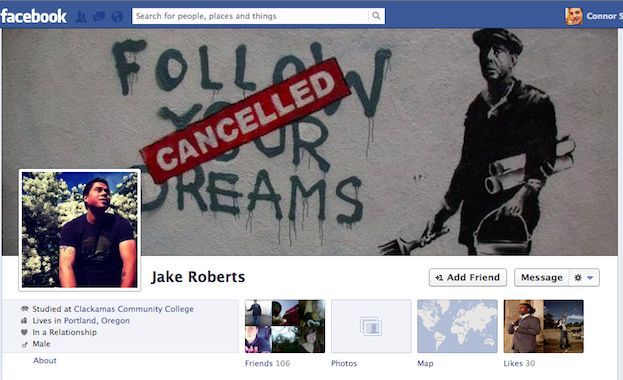
"Our Facebooks are our obituaries."
I've been thinking about this in the aftermath of Tuesday's shooting at Clackamas Town Center, a mall just outside Portland, Ore., about 20 minutes away from where I grew up. I don't remember who said this or where I might have read it, but it's a phrase that's stuck with me.
Agree or disagree, it's a chilling assessment of our dependence on social media to define ourselves and ascribe meaning to our daily lives. It's particularly apt in the case of those like suspected Clackamas shooter Jacob Tyler Roberts, who rise to fame on the wings of their seemingly random acts of violence. Intentionally or otherwise, these individuals immortalize themselves in their online footprints, which live on long after the crimes have been committed.
As details continue to emerge about Roberts, the 22 year-old gyro cook identified by police as the gunman who fatally shot two people and then himself, much of the media's speculation has centered on the rather unremarkable contents of his Facebook page. Within a day of the shooting, reporters and bloggers were picking apart Roberts' 200-word bio, cross-examining his likes and other recent activity in search of indicators about his mental stability or any hint of a motive.
This mad scramble to piece together a portrait of the killer is nothing new. Law enforcement rely heavily on social media, particularly Facebook, to mine incriminating information about suspects and solve (and sometimes prevent) crimes. But when a tragedy of this proportion strikes, it's not just police who are logging on; a keyword search on Google for "Jacob Tyler Roberts" and "Facebook" already turns up more than 200,000 results. Almost every article published about the shooting now quotes Roberts' Facebook page. Several are devoted almost exclusively to its content.
Why so much attention to Roberts' less-than-revealing Facebook? Chalk it up to human nature. As much as we like to think that we care most about remembering the victims -- 54 year-old Cindy Yuille, 45 year-old Steve Forsyth and 15 year-old Kristina Shevchenko, who survived the rampage but remains hospitalized in serious condition -- there is a lurid fascination with figures like Roberts. Everyone wants to understand what could have prompted this otherwise ordinary young man, who friends describe as good-natured and outgoing, to march into a busy mall with a semiautomatic and open fire on holiday shoppers.
What was the "breaking point" we wonder. Did something or someone "push him over the edge"? It's questions like these that drive the media and the public alike in search of the most easily accessible source for possible clues: Roberts' Facebook page. The desperate desire for understanding is a powerful force, and everyone is clamoring for a firsthand glimpse at who Roberts was and how he could have done such an unthinkable thing. So just as Twitter provides a direct line between celebrities and their fans, Facebook offers the tantalizing prospect of a sneak peek inside Roberts' mind, narrated in his own words.
But Roberts' Facebook isn't exactly a wellspring of information. In many ways, it's more or less what you'd expect from a 22 year-old male trying to figure out his life: offhand, jokey, a little dark but nothing to suggest murderous intent. Many reports have cited his claim to have lived "one crazy life" and the fact that he switched schools as evidence of a rocky childhood, but nothing so far substantiates that interpretation. Others have pounced on the (admittedly unsettling) fact that he lists "shooting" as a hobby, or that "Dexter" numbers among his favorite TV shows (Dexter is a show about a lovable serial killer).
Still, almost anything can be construed as sinister under the right set of circumstances, especially when taken out of context. Roberts also includes other outdoor activities such as "rafting" and "camping" as personal interests, as well as "hanging out with friends," "sleeping" and "sushi." He lists baseball as his favorite sport. Favorite bands include The Beatles and Beastie Boys, and he apparently liked the campy period flick "Across the Universe."
So is Roberts' Facebook his obituary? Does it tell the story of his life or shed light on the horrific circumstances surrounding his death? Not exactly. Facebook is no replacement for lived experience or human interaction, and users overwhelmingly distort the information they post in an effort to conform with whatever image of themselves they're hoping to project. But will what Roberts' wrote online (and there's bound to be more unearthed soon) continue to attract the feverish scrutiny and morbid curiosity of the masses? Without a doubt.
